#and doing the work to decolonize ourselves from whiteness
Text
The media blackout on what is happening is Iran Is utterly disgusting and I am mourning for every colonized country on earth that has integrated Islamophobia into their culture.
Tens of thousands of women and protesters will be executed and not one country is doing anything about it, let alone talking about it.
#this reality is so fucked up#if we don’t start paying attention to our unconscious bias’s#and doing the work to decolonize ourselves from whiteness#on a personal level#and on a cultural scale#idk what will happen#fuck the patriarchy#islam#iran#islamophobia#xenophobia#genocide#opression#capitalism#colonialism
63 notes
·
View notes
Video
youtube
(via (41) bell hooks on interlocking systems of domination - YouTube)
BELL HOOKS: I began to use the phrase in my work “white supremacist capitalist patriarchy” because I wanted to have some language that would actually remind us continually of the interlocking systems of domination that define our reality and not to just have one thing be like, you know, gender is the important issue, race is the important issue, but for me the use of that particular jargonistic phrase was a way, a sort of short cut way of saying all of these things actually are functioning simultaneously at all times in our lives and that if I really want to understand what's happening to me, right now at this moment in my life, as a black female of a certain age group, I won't be able to understand it if I'm only looking through the lens of race. I won't be able to understand it if I'm only looking through the lens of gender. I won't be able to understand it if I'm only looking at how white people see me.
To me an important break through, I felt, in my work and that of others was the call to use the term white supremacy, over racism because racism in and of itself did not really allow for a discourse of colonization and decolonization, the recognition of the internalized racism within people of color and it was always in a sense keeping things at the level at which whiteness and white people remained at the center of the discussion. In my classroom I might say to students that you know that when we use the term white supremacy it doesn't just evoke white people, it evokes a political world that we can all frame ourselves in relationship to.
And I think that I was able to do that because I grew up, again, in racial apartheid, where there was a color caste system. So that obviously I knew that through my own experiential reality, you know, that it wasn't just what white people do to black people that was wounding and damaging to our lives, I knew that when we went over to my grandmother's house, who looked white, who lived in a white neighborhood, and she called my sister, Blackie, because she was dark and her hair was nappy and my sister would sit in a corner and cry or not want to go over there. I knew that there is some system here that is hurting this little girl, that is not directly, the direct hit from the white person. And white supremacy was that term that allowed one to acknowledge our collusion with the forces of racism and imperialism.
And so for me those words were very much about the constant reminder, one of institutional construct, that we're not talking about personal construct in the sense of, how do you feel about me as a woman, or how do you feel about me as a black person? But they really seem to me to evoke a larger apparatus and I don't know why those terms have become so mocked by people because in fact, far from simplifying the issues, I think they actually when you merge them together really complicate the questions of freedom and justice globally, because it means then that we have to look at what black people are doing to each other in Rwanda, we can't just say racism, what have you. We have to problemitize nationalism beyond race, in all kinds of ways that I think there's a tremendous reluctance, particularly in the United States to do, to have a more complex accounting of identity.
34 notes
·
View notes
Note
i mean as an indigenous person, the domari people and the armenian diaspora in palestine are just as indigenous as palestinians. indigneity is produced via a relationship to an oppressive, colonizing entity, not "who lived here the longest"
I don't disagree with you exactly, but colonization is also layered.
So bear in mind that my knowledge of decolonization is specifically subaltern (as in the Indian subcontinent) and patchy (disabled my whole adult life and a very start-stop-stagnate tertiary education). The Americas might be different. I'm completely open to being wrong.
In Sri Lanka, the Sinhalese and Eelam Tamils are "natives" while "indigenous" are considered the Adivasi and Tamil Indigenous people in the North (I'm sorry I can't remember their names, only found out about them last year). The distinction arises because they were Austroasiatic people (and the Tamils were maybe Dravidians? Wow, ethnosupremacist black hole discovered) who arrived in migrations millennia before they were colonized by later migrants from the Indian subcontinent about 2500 years ago. Those are the progenitors of both the later Sinhalese and Tamil kingdoms. (Obviously both intermarried with the indigenous populations; ethnic identities are cultural). The Adivasi never assimilated into the Indian migrants' agrarian societies. They still engage in hunting and subsistence agriculture rooted in the ecosystems of their ancestral lands. Unlike the rest of the population, being transplanted from these lands to anywhere else in the country would result in a devastating loss culture and community.
"Indigeneity" is an extremely fraught topic in post-colonial nations when conflated with being "native". It erases the actual pre-agrarian tribes that were victims of colonization two or three times over, and is used for nationalist ethnic cleansing and the creation of ethnic underclasses. The myth that all Tamils were descendants of "Chola invaders" that arrived only a thousand years ago is foundational to Sri Lanka's Tamil genocide. Eelam Tamils themselves heavily discriminated against the Malaiyyah Tamils the British enslaved and exported from India to work their cash crops (Indian Ocean slavery is as brutal and horrific as the trans-Atlantic one). The persecution of Muslims who migrated here the last few centuries from South India, Afghanistan, Turkey and Malaysia also involves seeing them as interlopers, even though they never claimed to be native because their ethnic identities are shaped by their migrant roots and the unique ways they assimilated into Sri Lankan society. They still have ancestral lands here from which they've been ethnically cleansed and are still under threat by both Sinhalese and Tamils.
I'm not sure whether this is something unique to countries where the Europeans actually did fuck off forever. But if even if they never did, how do we discern our layers of colonization and oppression if we all believe we're indigenous? Do we ignore that the pre-agrarian societies* here are rooted primarily in the custodianship and protection of their ancestral lands, unlike the rest of us that thrive in mono-agriculture, industrial encroachment and urban sprawl (and constant ethnic violence)? Do we have to center European violence in our own understanding of ourselves and our responsibilities to acknowledge the histories and rights of minorities vulnerable to us?
To my understanding, the difference between "anti-colonial" and "decolonial" is that one is conceptualized as "resistance" and the other as "re-existence". What I've been taught is that seeing our place in the world through the white colonial lens and defining ourselves by colonial proximity is to give up our power of self-determination. We were native to this island before these violent borders imposed on us by the British ever existed, and we were native whatever kingdoms configured and reconfigured themselves over millennia. But we have also been violent colonizers of the people who were here before us, even during and after the Europeans came and went. Indigeneity afaik is acknowledging their identities and respecting the history that formed them, and the restoration of their long-obscured sovereign right to their lands independent of the nation state.
*I can't remember whether pre-civilization was a problematic term or not. I took like two modules on subaltern indigenous peoples five years apart lol.
#knee of huss#decolonization#indigenous rights#indigenous peoples#anarchism#i'm sorry but you have to be an anarchist to be decolonial#indigenous#sri lanka#subaltern#asks#anon
5 notes
·
View notes
Note
Gm! How’re you?
9 and 20?
Hello! I'm well, thank you, hope you're too! i'm sorry for the wait, took me a bit to be able to organize my thoughts and life got a little in the way of me writing them. But here they are:
9. What’s something you wish more people understood about the craft?
For the longest time, I wished more people would see how ancestral veneration (or at the very least, acknowledgement) is, in my opinion, essential to a well matured craft, and to a well matured person in general. In a way, my prayers were heard. Recently I've been seeing more people show interest in ancestral veneration and at least mention working with ancestors in their witching endeavours, but I think there's still an important aspect of ancestral work missing: unlearning and decolonizing. Acknowledging one's ancestry without actively working on healing any wounds it may come with (white guilt and how many run from their family's history and baggage, colonization, assimilation, all the internalized sexism, racism, etc, the list is endless) is honestly not only incomplete work but most times, actively harmful to others, as it perpetuates structures of genocide and cruelty.
We don't only inherit magic from our forebearers, we inherit our understanding and our ways, the good and the bad, and that makes a big part of the whole society we live in. It's our job to do our part to learn from Our Ancestors' errors and merits, better ourselves, and make the world better for those to come. That is as central to ancestral work and veneration, as a strong ancestral foundation is central to magic.
20. What’s something you’re currently interested in and/or learning about?
I've been working on deepening my understanding of our deep ancestors, to strengthen a relationship with them. I say our and not just my, because it's Ancestors who would've lived thousands of years ago and there's a good chance we share more than a few.
I've always worked with my ancestors very closely, but this is more like following the Ancestors of those Ancestors. Ancestors shared across the family tree and across societies, who've shaped much of what we know and do in the present in much of the modern world. I showed interest a while back, and after being consistent in my efforts and proving an honest heart, a certain someone answered back. I've been following their footsteps backwards, through the different eras and regions, letting the Ancestors' hands hold me and guide me on where I should make my next step like a blind man, while following the voice of an Entity or God I call The Father of Wilderness.
It's... interesting, to say the least. Not only because it puts our entire history as a species into perspective (which was the reason for my initial interest as an ecologist, how changes in our cultural and spiritual understandings over thousands of years have reflected in the respective changes in our behavior as a society, how we relate to other humans, but also in how we relate to nature and the ecosystem around us) but also because they have so much to teach about what truly makes us human. Regardless of all differences you can find between the lifestyle of someone in the modern day and someone who lived 20.000+ years ago, or even 200.000+ years ago, we're all human. It's the things that we can find in common across the ages, the things we can learn from Them about our own humanity, that fill my heart. Again, learning from Them across time and space, recognizing their errors and their merits.
I also have fun finding parallels between how the Father of Wilderness, Patron of this work, revealed himself to me, how he wishes to be honored, and with other people's deities or cults of similar figures. There's very specific details, differences, in our views and approaches, that are fascinating to see and keep my mind busy trying to untangle the why's of it all. I've been trying to put all my findings and thoughts into a written little something but it's long and it may take a while before I'm satisfied with it. If you're interested, eventually it'll see the light here as a blog post.
(You see a little bit of it hinted at here already, when I mentioned the value of an honest heart. It's not just words. In my experience, it's a must, a prerequisite to have the attention, guidance and favour of the Father of Wilderness.)
Thank you for asking! Getting all of that out of my brain and into somewhat not totally coherent words was a very good mental exercise.
#my Ancestors and Gods know I am the Inquisitive kind and I hope they have as much fun making me think and tinker#guiding me to the right places and things#guiding my hands and my mind to the right conclusions#as much as I have fun following their leads#my notes#Blood and Water#asks#ask game#musingmelusinesmelancholy
5 notes
·
View notes
Text
So...I just saw someone say shootings, like what we have seen in the United States with Uvalde, with Tulsa, and with Buffalo, are the result of mental illness.
I do not encourage hate or vitriol sent to this person, because they seem to just need to work on internalized ableism, and honestly, with how our society treats mental illness as a catch-all for evil, it's hardly surprising that it's entrenched itself in so many people's understanding of violence.
So, I'm going to respect the space they asked for and instead break it down here.
The first question you have to ask yourself when people say, "it's mental illness", is why this very vague blanket seems to only land on perisex cishet white men (with only a few exceptions of POC men) and almost never on perisex women, trans and enby men, nonbinary people, intersex people, etc. How could a mental illness so perfectly target such a small, specific demographic with almost no exceptions?
The issue is a sense of perceived power.
When the far-right is telling you that you, as a perisex cishet man, are the best out of a pool of people, and it is your job to weed out any potential threats to your position, and are specifically targeting you at impressionable young ages, that can get to your head and you may even start to believe it. Becoming part of a cult is not indicative of mental illness, but does signify that there was some fear that was accessible enough for others to use against you. Whether this fear was born of structural racism, or an irrational fear of resources being taken away from one group simply because another is advocating for their rights, it is found and usually is taken advantage of when it comes to "recruiting" shooters.
Because make no mistake, there is no such thing as a "lone wolf" shooter. That is merely something we tell ourselves so we don't have to accept the underlying issues with our society that inspired these acts to begin with. After all, that level of reflection would inspire us to bring about some semblance of change.
Blaming it on mental illness is along the same lines as telling ourselves it was the action of a "lone wolf" and not the result of a much bigger problem.
Here are some excerpts from writing by Jeremy Adam Smith. The link to the full article will be included below. This article was written in relation to the deaths of Black church -goers at the hands of Dylann Roof.
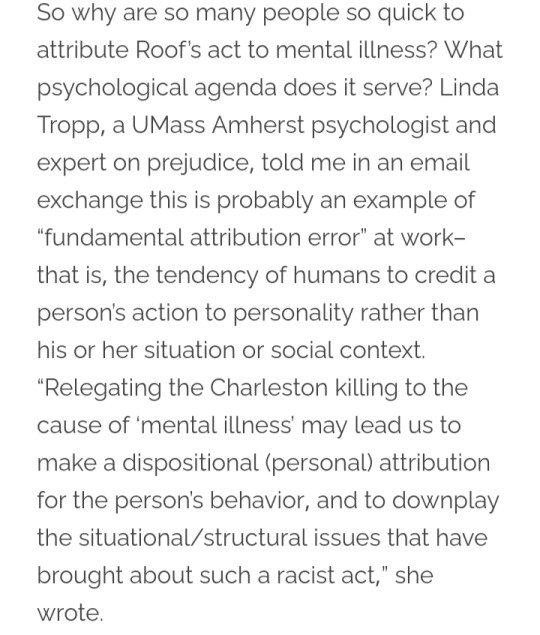

People use "mental illness" as a scapegoat so they won't hold the proper causes responsible. They would much rather remain comfortable than to admit that we have to decolonize and rework the society we are in, which includes the need to create a hostile place for white supremacists so that their ideology cannot flourish and take root.
Over time, this need to remain comfortable became a staple of our responses to tragedy. Even cries for change are quickly stifled by people waving it off as a 'political agenda'. We have become stagnant.
11 notes
·
View notes
Quote
Apocalyptic Anarchism is active destruction and a call for immediate action. There is no time to wait. We can testify with the Pandemic that not even a deadly airborne virus could get America to crumble and Ecological Collapse definitely won’t imperil empire. They will simply have us Work through it. We must understand that there will never be a perfect time to end this world. We do not have the luxury of passively waiting for a preordained opportunity. We must create our own opportunities to mortally wound the empire.
When people talk about decolonizing and dismantling white supremacy, what they are really asking for is the Abolition of the world. To destroy the world would mean a world without white supremacy and colonialism, the very things it was founded on. To me, Abolition and the apocalypse almost go hand in hand. We cannot fear the Apocalypse. We must move forward because Apocalypses are continual. We know not what the world is like without white supremacy, colonialism, and capitalism but we do know what it’s like to have our world continually ended. We have to ask ourselves, do we just stop at asking for the Abolition of Prisons, the State, Capitalism? No, we have to End the World on our terms.
“A Love Letter from the End of the World” by Saint
https://haters.noblogs.org/post/2022/04/15/a-love-letter-from-the-end-of-the-world-by-saint/
2 notes
·
View notes
Text
Today we introduced a new project to my 10th-grade Global Humanities entitled "Art is Resistance," it focuses on decolonization movements and postcolonial literature and art. After introducing key concepts and pre-setting historical context, we viewed the video of Chimamanda Adichie's TEDTalk, "The Danger of the Single Story."
One of the questions I asked my students as we discussed the presentation was, "what other 'single stories' exist in our country and the world?" A student responded with a question: "How are we supposed to know it's a single story? It's just what we know." I replied with something about how there are stories that are marketed as the only story, but that we know or can recognize are more complex. But, thinking back, his original point still stands. How do we actually do the work of recognizing which of our truths, which of our beliefs, which of our ways of seeing the world, which of the stories we tell ourselves, are single stories?
And, I hope I can dive deeper. What are the single stories I hold or have held? Which single stories have held me?
While it is difficult to know which story to begin with, once you have decided that, I think you can start by reflecting on what you "know" about that person or people or place. Then, begin to question how you know that. Does your information come from the media, literature, or from the actual people? If media or literature, who created it? What do we know of their background, beliefs, and motivations?
I'm also struggling to connect unearthing the single stories I hold to excavating my whiteness. Without a doubt, there is a White tradition of creating single stories about "others." As Adichie points out, we can wield such stories to gain and maintain power over others. It's interesting that while we (White people) created single stories for others, now to struggle with Whiteness is to realize we've not maintained any sort of story tradition about ourselves. Perhaps a story of superiority, or heroism and righteousness and glory. I can't escape the idea, or image, that the single stories we created for others were crafted like painting the negative space of an image so that the positive space comes forward, and is distinguishable, though we never explicitly outlined its form. We painted the shape of Whiteness with the shadows of the flawed, incomplete stories we told of others.
Much more to explore tomorrow. Hopefully I'll look closer into some single stories I hold, have held, and been held by.
0 notes
Photo

"All these rituals Brown, Black, and melanated folks have for staying safe in the world. It's our fear of the unknown, we think by dimming our light for white people's comfort, our safety might become known to us. White people will know we are not a threat. It sucks to know the body is a target. To know that the flesh and hair follicles I was born with can be weaponized against me." Happy Pub Day! Thanks to @rowhousepub and @christopher__rivas for the gifted copy. Brown Enough by Christopher Rivas is out today and it's one you don't want to miss if you're into stories about exploring identity, the experiences of being in between, doing anti-racist work and decolonizing your mentality. Rivas' voice was fresh, honest, introspective and he tells his story with full transparency. He shows us what doing the self work looks like and doesn't shy away from the ugly parts and difficulties and demonstrates how growth comes from acknowledging mistakes, making changes and finding a way forward and through for others. Rivas takes us on a personal journey of what it means to be Brown in America and the importance of owning identities for our ourselves. Rivas is candid about how Brownness often feels like being excluded, silenced or even forgotten. He also talks about the ways that living in a world of binary thinking doesn't leave room for intersectionality, equal representation and more nuanced conversations about identity. I loved that he illustrated that liberation movements thrive when marginalized groups show up for each rather than engage in the "what aboutisms". It was interesting to read his perspective about art and being creative and the ways that it can become a space to promote representation, open doors for other marginalized identities and provide activism. He is forthright about his identity struggles in Hollywood, imposter syndrome, colorism and anti-blackness in Latinx culture, what it means to be a child of immigrants, how he formed community and how challenging the process of unlearning white supremacy is. (CONTINUED IN COMMENTS) (at Bushwick) https://www.instagram.com/p/CjmICLyLumK/?igshid=NGJjMDIxMWI=
0 notes
Text
Things for White Fandom Nerds to Consider
Hey y'all,
After seeing a post where fans of color wrote about their frustrations with the ways white fans prioritize our comfort over their wellbeing and access to safe fandom spaces where they can have fun, be comfortable, and have their needs responded to and respected, I wanted to build out a separate post specifically addressing a few of the things I notice we white people tend to do in fandoms, and also offer resources for those of us who may be looking to break down our internalized white supremacist shit and change.
So, some questions for my fellow white fandom nerds to consider:
Are you attempting to learn more about white supremacy and how you've been raised on it, whether you like it or not?
When fans of color in a discord/forum/comments section name harm they are experiencing in said space, do you downplay that harm, ignore it, or outright contradict them, because well, things have been nice here for you?
Do you prioritize peace in fandom spaces over the comfort, wellbeing, safety, and joy of fans of color? Pushing for discussions of racism to be shelved or ended because they make you uncomfortable?
Do you insist that you can't be a force for white supremacy, because of another marginalized identity you hold? (True facts, my fellow white disabled queers, we are still mechanisms for the white supremacy machine against communities of color whether we want to be or not. There are people of color living with the same queer crip identities we have who are navigating vastly different roadmaps because they're Black and brown, and we need to build skills in acknowledging those differences and being able to engage in real conversations and work around them)
When someone points out racism creeping into your fanworks, do you recognize that as an act of good faith, that they are trusting you to receive that knowledge and change? Or do you become defensive and dismiss them?
Are you only interested in characters of color if you think they're hot and want to watch them kiss whoever else you think is hot? Do you flatten them down to being a white character's love interest/bestie/confidant without building them out the same way you do your white faves?
When you do come up with headcanons for characters of color, are you considering the ways racism may be playing in there without you thinking about it, because you don't have to think of those things? (I'm thinking of the deeply fucked up "Miles Morales shoplifts" thing I saw drifting around a while back. Shoutout to the humans who said fuck that and went "Miles Morales takes up Ballet instead because I loved that shit personally")
Do you love reinterpretations of characters as people of color and share art and writing that shows these depictions, but prioritize this from other white creators over creators of color? (This does not me white creators shouldn't draw or write characters of color, the issue here is who gets praise for "diversity" in their work and who gets ignored or criticized)
Do you care for people of color when they're characters in the things you enjoy, but struggle to care about systematic oppressions without relating them back to your fandom (Thinking this time of the surreal "If you like K-pop care about orientalism" situation that happened like two weeks ago)
Do you get caught up in feelings of shame and guilt around the power whiteness gives you, and seek out people of color to make you feel better about how good/bad you are as a white person?
There is not a magic wand for undoing racist and white supremacist values we've internalized. And there is no "Tada~ you've hit the end of the journey, all your racism is gone and now you are a Truly Good White Person" moment. Because things are way muckier than that. Racial Justice work, and becoming a traitor to white supremacy is about the ongoing practice of :
building self-awareness
having the resilience to face our harmful actions
taking accountability for our behavior
developing a cultural identity outside of the sterilized concept of White that white supremacy has constructed
speaking out against racist policies, practices, and interactions in the spaces we are in
supporting the movement towards abolition
developing resilience in ourselves so we don't run to people of color in our lives for reassurance every time white guilt screeches in our ear
Learning how to be in spaces where our every thought fart is not the center of attention
relearning history from a decolonized lens
Way more than could be condensed into a Tumblr post which will be rapidly forgotten or metabolized by the internet
That said if you're the reading type, might I recommend checking out Rachel Cargle's Community POC Reading Recommendations spreadsheet?
This spreadsheet is not specifically for Racial Justice, but it is broken up by genre and the nonfiction section has a lot of work by authors of color talking about Critical Race Theory, racism, white supremacy and related subjects.
#critical race theory#Fandom Racism#White people#Whiteness#Anti racism#racial justice resources#white fandom#allyship#queer ally#ranting about racism while loopy from insomnia wise choices we make here today
796 notes
·
View notes
Text
The Nap Gap
Rest is not something you must earn. Napping is a political act in a society that values its inhabitants for our productivity and capacity for overwork. What privileged few are allowed to rest, and who chooses?
The well-documented racial sleep gap "shows that Black Americans are five times more likely to be sleep-deprived than their white counterparts (1)." This is about more than just sleep. The nap revolution, led by theologist Tricia Hersey, has roots in slavery when more slaves were whipped for oversleep than anything else (2). In Haiti, zombie lore permeated the culture of enslaved people for whom death was the only escape from the brutal horror of slavery on sugar plantations.
The Importance of Self Care
Self care and rest are cornerstones of revolution; without it, martyrdom will consume you. Dealing with oppressive authorities can feel crushing, witnessing the people around us stay disenfranchised and under-resourced and disregarded, explicitly excluded from growth and prosperity. To combat this, we must take action in our own lives, our own communities, for our own health.
Self care is about more than just bubble baths and long sunset walks. Self care, especially for women of color, necessitates the decolonization of our minds. To truly care for ourselves, we must process and then destroy the concept of ourselves that was created and limited by the white supremacist patriarchy in which we live. This might look like finally accepting all of your emotions as valid, even the ones that correlate with stereotypes (e.g. Angry Black Woman). It's okay to be angry—in fact, it is only right to be angry in the wake of injustice. It is self care to make Good Trouble.
Self care comes from systemic nurturing, not individual boot-strapping. We may feel so disempowered that we feel that nothing will ever change, but that's not true. We cannot control other people, but we can change and grow ourselves and our communities and our cultures in collaboration with our allies. To do this, we must decolonize our minds..
To survive white supremacy, we must cultivate safe spaces to heal intergenerational trauma, whether those spaces be in a journal or in a race caucus at work. Self care is surviving the systems we've been thrown into, like roses growing through concrete until we can break through and thrive in the sun.
Nap Activism
Rest is the opposite of capitalism's "grind culture," which only values people for their production output. This system exhausts people to the point of collapse. Without rest, there is no capacity for resistance nor dreaming of a better world.
According to the mission of The Nap Ministry, the folks at the forefront of nap activism, this work seeks to "honor, reimagine, and recapture the dream space that was stolen for centuries."
The "nap gap" is real: Black folks & other people of color are more likely to have sleep issues than white people due to the stress of racial oppression.
This intersection with other forms of inequality leads to gaps in both physical and mental health as well as decreased productivity at work (which factors into income inequality!)
Self-care is a necessity for all oppressed folks who are healing from intergenerational Trauma--Black women especially.
Sources
https://elemental.medium.com/its-a-right-not-a-privilege-the-napping-resistance-movement-54fc147ba32b
https://www.theatlantic.com/entertainment/archive/2015/10/how-america-erased-the-tragic-history-of-the-zombie/412264/
#self care#self help#mental health#oppression#racial oppression#the nap ministry#naps#nap gap#nap#nap activism#activism#racial justice#capitalism#anticap#tricia hersey#health inequality#fuck capitalism#medical industrial complex#racism#good trouble#black americans
16 notes
·
View notes
Text
MLK Day Resources
Decolonize your understanding of Dr. King’s teachings and his legacy
Listen to this while reading Eye on the Prize -- Civil Rights Hymn
King’s philosophy of nonviolence: “Nonviolent direct action seeks to create such a crisis and establish such creative tension that a community which has constantly refused to negotiate is forced to confront the issue… There is a type of constructive, nonviolent tension which is necessary for growth. Just as Socrates felt it was necessary to create a tension in the mind so that individuals could rise from the bondage of myths and half-truths to the unfettered realm of creative analysis and objective appraisal, we must see the need of having nonviolent gadflies to create the kind of tension in society that will help men to rise from the dark depths of prejudice and racism to the majestic heights of understanding and brotherhood.”
King on bootstrapism: “. . .when white Americans tell the Negro to “lift himself by his own bootstraps”, they don’t look over the legacy of slavery and segregation. I believe we ought to do all we can and seek to lift ourselves by our own boot straps, but it’s a cruel just to say to a bootless man that he ought to lift himself by his own bootstraps.”
King’s rebuttal that nonviolence is passive: “Nonviolent resistance … avoids not only external physical violence but also internal violence of spirit. The nonviolent resister not only refuses to shoot his opponent but he also refuses to hate him. At the center of nonviolence stands the principle of love. The nonviolent resister would contend that in the struggle for human dignity, the oppressed people of the world must not succumb to the temptation of becoming bitter or indulging in hate campaigns. To retaliate in kind would do nothing but intensify the existence of hate in the universe. Along the way of life, someone must have sense enough and morality enough to cut off the chain of hate. This can only be done by projecting the ethic of love to the center of our lives.“
Video & Literary Resources on Dr. King and lessons influenced by his resistance work:
Dr. King’s Letter from a Birmingham Jail - April 1963
Dr. King’s 1967 speech (video) - The Other America
Dr. King’s 1967 speech (video) - New Phase of Civil Rights
An Experiment in Love: Martin Luther King, Jr. on the Six Pillars of Nonviolent Resistance and the Ancient Greek Notion of ‘Agape’ || Maria Popova
Prof. Ibram X. Kendi: Stamped From the Beginning: The Definitive History of Racist Ideas in America (video) || American Historical Association
Teaching the History of Racist Violence in the High School Classroom (video) || American Historical Association
THREE PRINCIPLES OF CIVIL DISOBEDIENCE: THOREAU, GANDHI, AND KING || Nick Gier
A Rap on Race: Margaret Mead and James Baldwin’s Rare Conversation on Forgiveness and the Difference Between Guilt and Responsibility
Decolonized Books to Read:
The Sword and the Shield: The Revolutionary Lives of Malcolm X and Martin Luther King Jr. by Peniel E. Joseph (2020)
Going Down Jericho Road: The Memphis Strike, Martin Luther King's Last Campaign by Michael Honey (2008)
A More Beautiful and Terrible History: The Uses and Misuses of Civil Rights History by Jeanne Theoharis (2019)
From Here to Equality: Reparations for Black Americans in the Twenty-First Century by William Darity (2020)
#resources for you#blm resources#book recommendations#for future reference#dr. martin luther king jr.#Martin Luther King Jr.#mlk day#compilation
39 notes
·
View notes
Note
Hm this is a long shot but do u have any readings on the topic of spirituality in organizing? Or spirituality by another name, but the behavior u are getting at ig. Growing up the closest religion I had at hand was Catholicism thru my grandma, and my mother was ‘spiritual’ but used it to confirm her own biases in a weird way. These made me wary of religion (well like a type of christianity and white co-option of spiritual practice, but I didn’t realize that growing up) but I definitely think in “religious” ways like u described, however because I haven’t considered myself a spiritual person, I’ve left it unexamined which I’m sure is leading to problems. Got into organizing last year with a prisoner support group and it would be nice to develop a way to critique/understand our approach to the work in these terms but wouldn’t know where to start.Thank you and if this isn’t something that can rlly be learned thru reading like I kinda expect, no worries and no need to answer this ask! Have a good day!
Hmm.. Nothing wrong with a long shot. I'm a believer in high aim.
So the thing with this is yeah, you're right, you can't really learn this through reading. Largely bc what you need is to unlearn something and partially because it's very difficult to unlearn something in the same medium or framework you learned it.
FIrst off though let me say congrats on actually, like, following that thread of self-reflection. It's incredibly important to have that level of self-awareness and perspective especially when your aim is compassion and social work- if we are not aware of ourselves we continue to do harm to others even when we intend otherwise.
You're definitely not alone in your position. Two main points:
1. This is actually sort of the first step in the Ancestral work I mentioned, something largely left out of mainstream western culture because aside from patron saints and black church traditions, ancestor veneration is largely absent from this culture specifically due to the practice having been persecuted by xtianity in other cultures and also because the traumas of war and colonization lead to people not wanting to go back and learn their histories or not knowing, or only knwing hugely inaccurate sensationalized versions of who their ancestors were. Asking yourself "What beliefs and behaviors did I inherit from my parents?....and where did they get theirs from?...And where did my grandparents get theirs? (and on all accounts how did the lives they lived affect this, and how does that relate to me today..?)" is the very beginning Ancestral Work. This is how you find out about deeper layers of yourself in order to decide what to do with them. But I don't wanna say more on this bc it's a whole huge thing.
2. And here is my second biggest gripe with xtianity: Aside from the whole persecuting and killing people thing, and the upholding a separation between self and spirit (so fucking dangerous), the fact that xtianity caused so much damage and trauma has been sufficient to cause a significant number of people to become avoidant of not just religion, not just spirituality, but even belief in general.
This has robbed humanity of so much and caused so much violence.. ugh but that's another rant. Anyway it's the source of this really ironic but common thread of people who consider themselves Atheist or anti-religion when they're really anti-xtian, but in doing so cut themselves off from meaning-making and deeply human forms of connection and self empowerment. And this has wrecked culture and mental health and so on and so on.
So anyway to come back around, I would, as ever, point you to the work being done around decolonization. In my experience, which began from an agnostic scientific-philosophical lens, moved through buddhist practice and philosophy for years and grew all the way into reclaimed indigenous animist practices of my lineages, I find that decolonization is the most efficient and accurate key path, because knowing what, specifically, was imposed upon and persecuted out of various cultures and why will tell you precisely where, culturally, you got your preconceived notions from and- very importantly- what other meaningful notions or worldviews preceded them.
It's one thing to say "well I don't wanna be religious like my family" it's another thing entirely to actually replace that empty space with informed, personally aligned meaning. Nature abhors a vaccum and that space DOES get filled with shit if you don't organize it yourself.
Happy life journey.
6 notes
·
View notes
Text
Neocolonialism and Indigenous Communities in the Americas
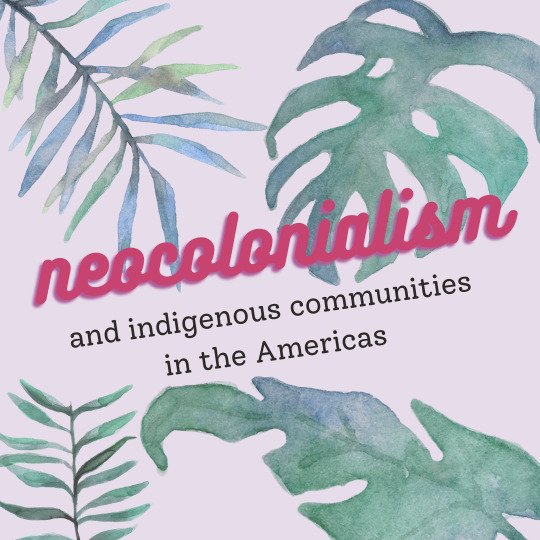
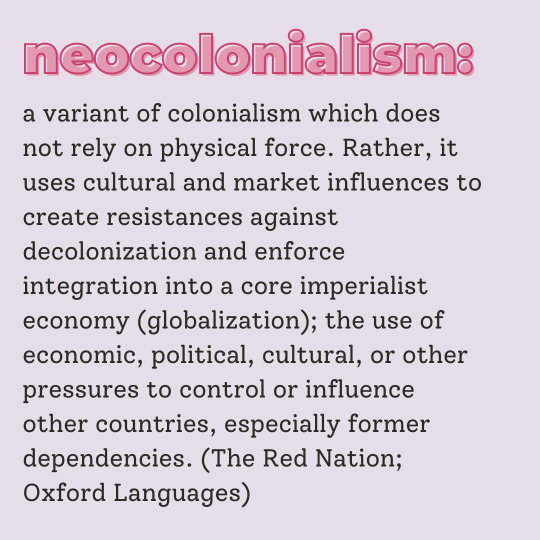
Through the lens of neocolonialism, it is important to point out that this form of colonialism is mostly dependent on cultural forces and ideas in order to maintain the power and influence of white settlers (or even non-white settlers that have access to a lot of power, money, and influence; corporate capitalists, basically).
neocolonialism: a variant of colonialism which does not rely on physical force. Rather, it uses cultural and market influences to create resistances against decolonization and enforce integration into a core imperialist economy (globalization); the use of economic, political, cultural, or other pressures to control or influence other countries, especially former dependencies. (The Red Nation, Oxford Languages) [for a more expansive definition of neocolonialism and it's characteristics, please check out my other blog post here]
I would say that some of the largest of neocolonial influences are the systems and/or institutions that embrace capitalism (specifically racial capitalism), resource exploitation, labor exploitation (that happen as a result of racial capitalism), and the persisting influence of the Christian religion via religious institutions (like the Catholic Church and other religious schools). Neocolonialism intersects quite literally with the structure of the prison industrial complex (but I will talk about that a bit at the end of this blog post and write a whole blog post dedicated to those specific intersections). It is also important to note that neocolonialism argues that the systems of the colonial era are internalized in our bodies. In order for these systems to continue to function, these institutions must work to internalize these cultural forces/ideas (like basically low key brain-washing to be honest) that affect our self-concept, the relationship with our bodies, and our access to resources.
Capitalism, labor exploitation, and parallels today from the "Colonial" era
There is a connection between how labor exploitation plays out today and the exploitative history of slavery during the colonial era, a lot of it is apparent in various industries (like the fashion/textile industry, prison labor, etc.) But in this blog post I'm going to mostly talk about the exploitative labor practices of the Hollywood/film industry and how they exploit indigenous communities through labor and the use of their land. I will also be talking about the capitalization of other natural resources such as water, which is a huge problem indigenous communities are facing today.
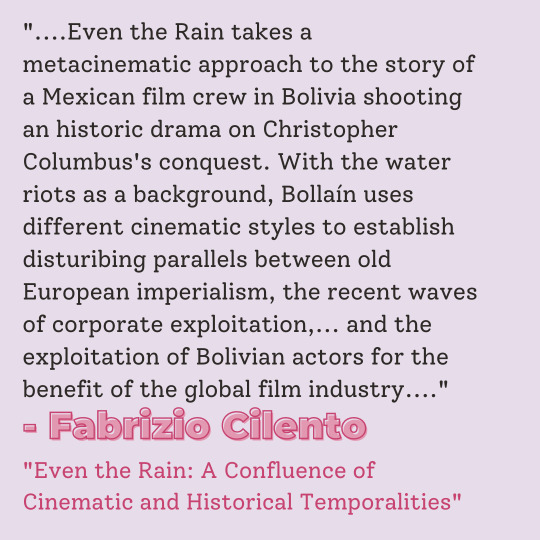
An example of the exploitative labor practices in the film industry can be found through the analysis of the film Even the Rain. In Fabrizio Cilento's article "Even the Rain: A Confluence of Cinematic and Historical Temporalities, Cilento breaks down how the film "takes a metacinematic approach to the the story of a Mexican film crew in Bolivia shooting an historic drama on Christopher Columbus's conquest. With the water riots as a background, Bollaín uses different cinematic styles to establish disturbing parallels between old European imperialism, the recent waves of corporate exploitation,... and the exploitation of Bolivian actors for the benefit of the global film industry.... Bollaín warns that these productions can fall into a colonialist dynamic by reproducing the imbalances between the 'visible' countries in the global film market, and 'invisible' countries whose native actors and visually appealing locations are exploited...." It is important to note how the persistence of capitalism and the exploitation of resources (whether that be land or labor) continue to work against decolonization and creates similar power imbalances between indigenous communities and corporate capitalists that allude to the colonial era. This is also a prime example of how there is a continued rift between the indigenous people's relationship to the land, especially through the limited access to water.
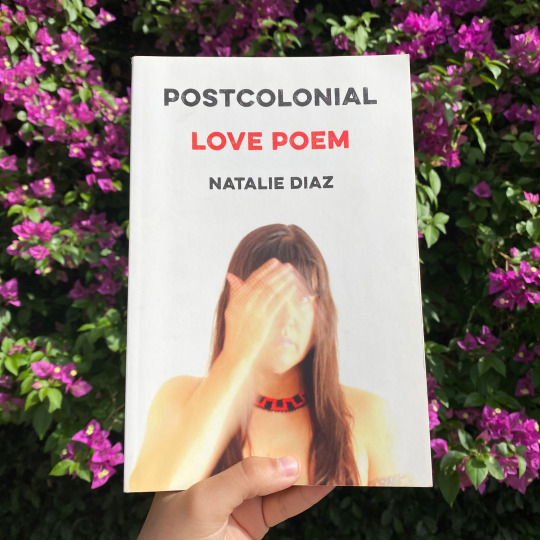
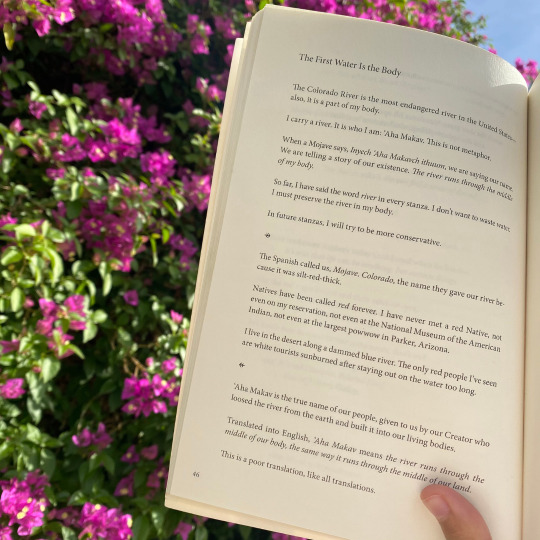
(Postcolonial Love Poem by Natalie Diaz)
So, I would like to make the point that capitalism and corporate interests play a huge role in working against decolonization. We do not live in a "Postcolonial" world, but rather, a neocolonial world that continues to exploit indigenous communities for their (quite frankly already limited) resources. Today, many Native Americans/Indigenous people have trouble accessing water like the First Nations in Canada, the indigenous tribes in the United States, and indigenous communities in Latin America and the Caribbean (whom are 10 to 25 percent less likely to have access to piped water than the region’s Non-Indigenous populations according to this page/report).
For more in depth discussion about the water and land crises indigenous communities are currently facing. All My Relations podcast, which is a podcast run by Matika Wilbur (a visual storyteller/photographer from the Swinomish and Tulalip peoples of coastal Washington) and Adrienne Keene (a citizen of the Cherokee Nation and blogger that discusses cultural appropriation and stereotypes of Native peoples in fashion, film, music, and other forms of pop culture, and a faculty member in American Studies and Ethnic Studies at Brown University.), have done an episode about this topic named Healing The Land IS Healing Ourselves in which they discuss with Kim Smith (a Diné woman, community organizer, citizen scientist, activist, water protector, entrepreneur, and writer) about indigenous' communities relationship with the land, how it relates to the current environmental and water crisis, and the relationship it has with healing our bodies, in which Smith discusses that "violence on the land is violence on our bodies".
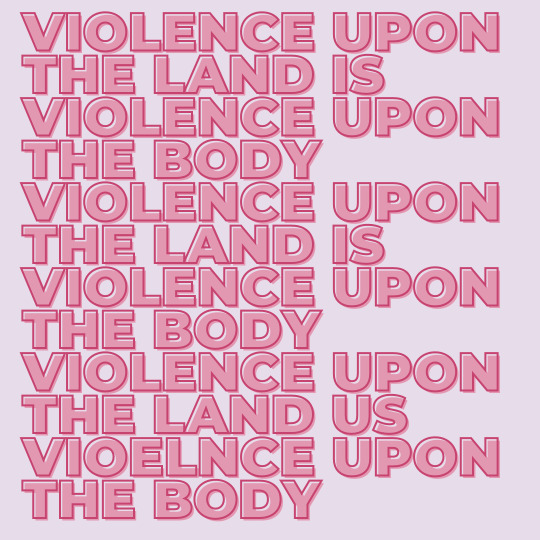
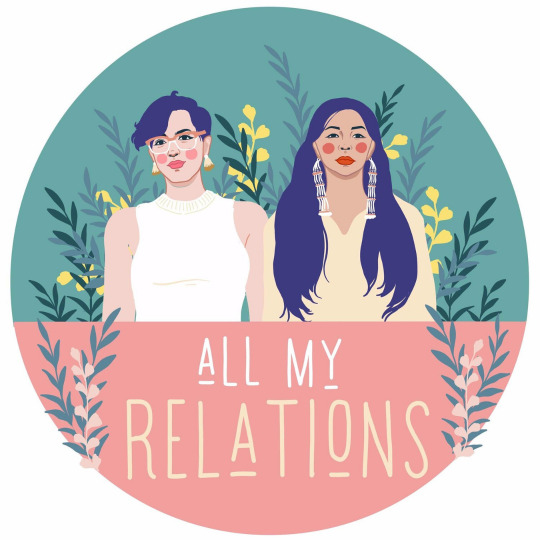
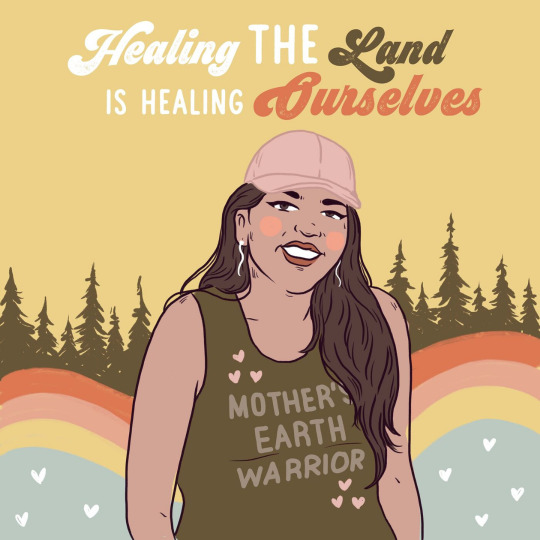
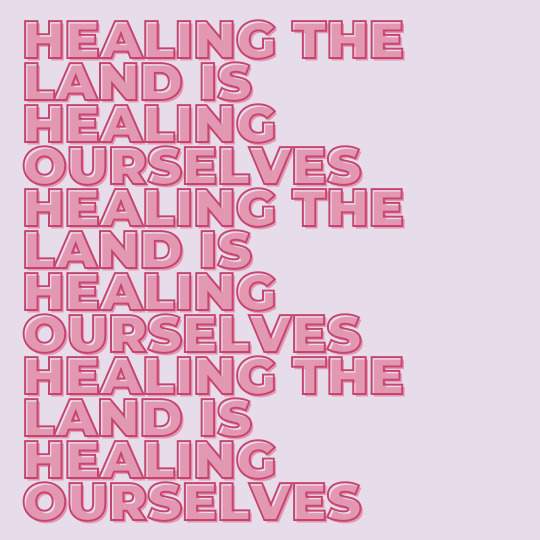
The Catholic Church, colonialism, sexuality, and it's influence today
When we're talking about colonialism in the Americas and the remnants of the colonial era today, the conquest of indigenous sexuality/eroticism via the Catholic Church and the repression of indigenous sexuality has played a huge part in colonialism and is still an issue today that perpetuates the erasure of indigenous identity.
In Sylvia Marcos's article "Indigenous Eroticism and Colonial Morality in Mexico: The Confession Manuals of New Spain" Marcos explains that "....By condemning indigenous erotic practices and imposing unprecedented restraints on them, the missionaries altered the roots of ancient Mexican perceptions of the body and the cosmos...." Marcos further unpacks this through probes of confession manuals from the colonial era "....The confession manuals of Molina, Baptista, Serra, and others seem to indicate the missionaries' uneasiness over the diversity of sexual pleasures enjoyed by the souls in their charge. The priests had to repeatedly describe their limited idea of sexuality so that the vital Indians could understand that what for them was often a link with the gods was, in their new religion, always a sin, fault, or aberration.... The morality of negation and abstinence propagated by the missionaries became one more weapon used in the violent process of violent acculturation...." It's important to point out that the repression of the sexual pleasures of indigenous peoples has contributed to the erasure of indigenous identity, especially since they considered it as a means of connecting to their gods. This was used as a weapon to conquer indigenous people's bodies through shame and disconnection from their bodies and spiritual practices.
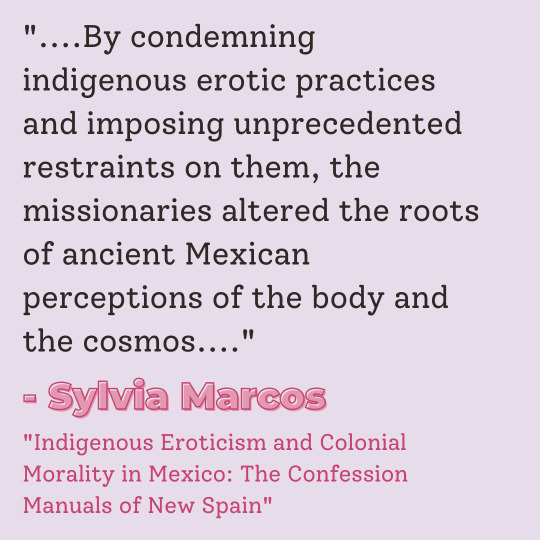
This is still an issue that persists today, this article by the Washington Post, talks about how transgender Native Americans experienced disproportionately higher rates of rejection by immediate family. It also talks about the state-sponsored Christian schools that have affected indigenous for generations in the United States. So, basically the expansion of Christianity/Catholicism culturally and institutionally and the repression of indigenous sexuality has contributed to the erasure of indigenous identity. And indigenous people that fall outside of the gender binary experience stigma still to this day, which perpetuates colonialism.
To further build upon this point and how to begin explaining the intersection of this with prison abolition and the experience of being Black and/or BIPOC in an imperialist white supremacist capitalist patriarchal society, Estelle Ellison, a Black Trans disabled writer and transformative justice practitioner, in their essay "Gender, Time, and Other Methods of Policing the Body", Ellison unpacks the intersections between exploitative racial capitalism and how it connects to gender, time, and sexuality, and also explains how it is connected to being policed through our bodies by stating that "By design, each of us is expected to participate in gendering other people's bodies...." and that "....of all the possible ways that a person may live their life at any given moment, the infinite combinations of features, experiences, aspirations, and expressions; gender attempts to reduce our possible identities by half. But half of infinity is still infinity..." Ellison also talks about how time has been colonized (via capitalism through wage labor) and is "made possible by overlapping systems of white supremacy, anti-blackness, patriarchy, ableism, misogyny, transphobia, homophobia, exploitation, and countless other forms of oppression..."
instagram
Ellison's analysis of the intersecting systems of neocolonialism explains how these systems are internalized in our bodies and how it is connected to exploitation (whether that be from our bodies some other form under these systems) and that we are being policed through our bodies due to societal, cultural, or institutional pressures, such as the prison industrial complex and the military industrial complex, or I would argue through religious beliefs.
Do you enjoy my content?
If you find my content to be interesting, please consider donating (but only if you can/would like/able to) so I can continue to post content with free resources and/or low-cost and accessible resources :)
Venmo: @Rebecca-Hiraheta
CashApp: $RebeccaHiraheta
Or if not, please feel free to support me by giving me a follow here or my other social media accounts
insta: @beccuhboo
personal blog: @beccuhboo
8 notes
·
View notes
Text
What does it mean to be for a Place?
The following is a summary of a recent publication in Pacific Conservation Biology by a group of David H. Smith Conservation Research Fellows: Stephanie Borrrelle, Jonathan Koch, Caitlin McDonough MacKenzie, Kurt Ingeman, Bonnie McGill, Max Lambert, Anat Belasen, Joan Dudney, Charlotte Change, Amy Teffer, and Grace Wu. You can read the full article here.
When asked “Is protecting biological diversity and the ecosystems that support all life important to you?” most people would say “yes.” This is the work that conservation scientists like me and my friends do. We do things like figure out how to protect endangered bee species in Hawaiʻi (Koch), inform agencies how to manage the endangered whitebark pine in the Sierra Nevada (Dudney), and study how plants that grow on mountaintops in Maine are impacted by climate change (McDonough MacKenzie). However, many of us are not from the Places* we’re working to protect. In fact, many conservation scientists are descendants of colonizers and settlers (settler-colonizers) who removed, or benefited from the removal of Indigenous Peoples from these Places, which are their ancestral lands. Indigenous Peoples practicing diverse cultures lived for millennia in North America stewarding the land.
The Indigenous Peoples displaced by colonialism have distinct knowledges and cultural identities directly rooted in their lands. For example, Mauna Kea is more than a dormant volcano on the island of Hawaiʻi to the kānaka maoli (Native Hawaiians). The mountain is their biophysical and genealogical ancestor, a sacred site for cultural and spiritual activities. Another example is how Aboriginal Peoples in Australia practice cultural fire “for biodiversity, to protect the landscape, and for cultural reasons, all in one” (Steffensen 2019, p233).
Indigenous Peoples’ distinct genealogical and cultural relationship to the land and all the other beings they share the land with is far different than the relationship of settler colonizers to Place and nature. Industrial society is traditionally and intentionally very disconnected from nature, beginning with European states removing peasants from forests and the commodification of nature (Tsing 2005). For example, many of us don’t know where our food comes from; don’t have religious or cultural traditions connecting us to Place, the land, or nature; and don’t know the natural history of the creatures we encounter everyday.
So you can imagine it is more than awkward for settler-colonizer conservation scientists to be the only or dominant source of knowledge about how to conserve a colonized Place, yet for decades this has been a common occurrence. In some cases, conservationists have attempted to act as “white saviors” to local Peoples by centering the work around themselves and excluding local experts (see this piece about conservation in Africa by Mordecai Ogada). In other cases, settler-colonizer conservation has furthered the oppression of local Indigenous People by removing them from their homelands and calling them poachers when they hunt there (see this piece on US National Parks by Isaac Kantor). All with few long term conservation achievements to show for it—for evidence, look no further than the UN Convention on Biological Diversity. Turns out, preserving biodiversity is hard, as is adapting to climate change. At the local level, both of these issues require some global settler-colonial science as well as intimate knowledge of and human interaction with individual Places. I wonder who has that? ...
Some settler-colonizer/non-Indigenous conservation scientists are now beginning to listen to Indigenous knowledge keepers, collaborate on research with Indigenous groups, and, in some cases, supporting and following the lead of Indigenous managers of their ancestral lands and waters. Conservation scientists are beginning to understand that the only way to long term conservation successes is to develop conservation strategies that also support the social and physical wellbeing and self-determination of the people who live there. But these settler-Indigenous partnerships are built on a troubled history of colonial violence and oppression. So, how do settler-colonizer conservationists proceed in a way that does not perpetuate harms to Indigenous Peoples? In other words, what does it mean to be for a Place when you’re not from that Place?
Several of my scientist friends and I wrestled with this issue after visiting kia’i (protectors) of Mauna Kea (Mauna a Wākea). It was October 2019 and we were hosted by Moana “Ulu” Ching and Noelani Puniwai, both of whom are kānaka maoli, conservation scientists, and friends with one of us (Koch).
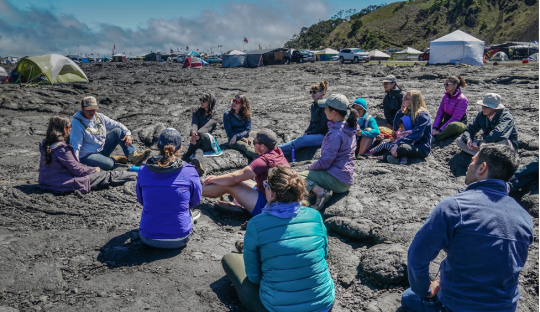
Noelani Puniwai and Moana “Ulu” Ching (far left) met with our group of Smith Conservation Fellows at Pu’u Huluhulu near the base of Mauna Kea. We sat on black lava rock from an old lava flow. (Photo by Joan Dudney)
We met at the bottom of the access road to the summit of Mauna Kea. Here was a tent community of kiaʻi protesting the construction of a new telescope called the Thirty Meter Telescope on the summit of their ancestral Mauna Kea. They were occupying the entry road to prevent construction vehicles from accessing the summit; 33 kupuna (Elders, grandparents, ancestors) were arrested several months earlier marking the escalating tensions between the kiaʻi and the governmental and private institutions involved in developing the Thirty Meter Telescope. The telescope is the continuation of colonialism on Mauna Kea sponsored by 11 nations and universities against the wishes of and providing little economic benefit to kānaka maoli. Not only does construction of a 14th research structure threaten the fragile ecosystems and endangered species at the summit of Mauna Kea, construction also perpetuates a long history of colonization in Hawaiʻi that threatens the cultural, economic, and ecological well being of kānaka maoli.
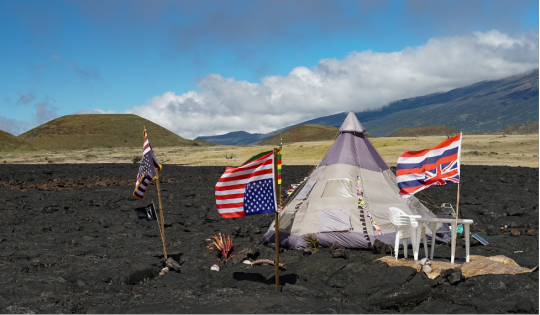
One of the tents at the protest site. The upside down American and Hawaiian flags represent the kānaka maoli rejection of these colonial powers. The upside down Hawaiian flag can be seen on cars and buildings throughout Hawai’i. (Photo by Joan Dudney)
We listened as Ulu and Noelani described their experiences and perspectives on Mauna Kea and the telescope. Afterward they invited us to participate in midday protocol, and we were humbled by the experience. Protocol is a sacred community building activity that happens every day and consists of oli (chants), pule (prayer), and hula (dance). Non-kānaka maoli were allowed to observe the protocol and were invited to participate in a certain part. We showed our respect to Mauna Kea by standing in our bare feet on the road to her summit for the protocol. In one hula we were sending our energy and strength to Mauna Kea.
As conservation scientists we wanted to show our solidarity with the kiaʻi. We wanted to voice our objections to the Thirty Meter Telescope in terms of conserving the fragile summit ecosystem, and equally important, call for an end to continued colonialist practices in the name of settler-colonizer science. We channelled this energy into a policy statement opposing the construction of the Thirty Meter Telescope on Mauna Kea, which was later adopted by the Society for Conservation Biology. We further reflected on the experience and wondered what first-hand learning we could share with other conservation scientists embarking on anticolonial conservation work. We came up with a series of recommendations for scientists. You can read all of them here. Here are three major ones:
Recognize the ways conservation theory and practice perpetuate the myth that North America was “empty” and “new” upon European “discovery.” For example, the mistaken belief that US National Parks never had human inhabitants despite the fact that Indigenous People have been living in and managing the lands and waters of North America for millennia.
Build authentic relationships with the Indigenous Peoples whose lands we are working on. Realize that settler-colonizer science is not the “correct” or only way of knowing.
Educate ourselves by learning about the history of the Places where we work and live and the Indigenous people affected by colonization. Read books and articles written by Indigenous scholars. Teach ourselves. After you have done the work to learn about the history and people(s), then reach out to Indigenous scholars, land stewards and managers.
We believe that being “for a Place” when you’re not from a Place means respect for Indigenous knowledge, continuous reflection on the consequences of our actions, and a willingness to act with humility, embrace complexity, and maintain hope. We are excited to grow and learn and contribute to the transformation of conservation science into a more inclusive, equitable, and just discipline.
*I capitalized Place throughout to emphasize its importance, akin to a person’s name being capitalized.
The Carnegie Museum of Natural History is on Seneca land and waterways, the homeland of the people we call the Monongahela, and lands and rivers used by and culturally connected to the Lenape, Shawnee, Wyandot, and Osage. I honor these ancestors, am grateful for their stewardship of these lands and waters, and acknowledge and respect their descendants alive today.
Bonnie McGill is a science communication fellow in the Section of Anthropocene Studies. Museum staff, volunteers, and interns are encouraged to blog about their unique experiences and knowledge gained from working at the museum.
Work cited
Steffensen, V. 2019. Putting the people back into the country. In: Decolonizing Research: Indigenous Storywork as Methodology. J. Archibald Q’um Q’um Xiiem, J. B. J. Lee-Morgan, and J. De Santolo, eds. Zed Books (London).
Tsing, A. L. 2005. Friction: An Ethnography of Global Connection. Princeton University Press (Princeton and Oxford).
#Carnegie Museum of Natural History#Place#Anthropocene#Science Writing#Scientific Research#Hawaii#Mauna Kea
17 notes
·
View notes
Text
A “Modest” Introduction
What is the point of this blog?
Do you even care?
Context is Key, so Get to Know Me
For those who find me here, I am Aquirius (not Aquarius, Aquirius). The word “qui” is within my actual name and a nickname I’ve had from a young age. I am an Aquarius sun, and heavily identify with this placement. I am a nonbinary individual (They/Them preferred). I am a neurodivergent individual with ADHD and diagnosed chronic depression and anxiety. I am a witch and nature is my spirituality. I am a writer and content creator who became caught up in the throws of a privileged, catholic upbringing. This meant college and a career path in business.
I went to school and was an over-accomplished student due to my ADHD brain and hyper-focus on “winning” and “success” (most notably financial success), because that’s what I was taught was important. Just before my senior year of university began, I lost one of my best friends at the age of 21, suddenly, and due to something no one saw coming or could stop...a seemingly random case of cardio-respiratory failure. This altered the course of my life, the way that I saw my self, and how I valued my life and the lives of those I love.
After half a year of disassociation, panic attacks, and inability to function as a human adult, I somehow made it to graduation. After not applying to a single job due to my mental and emotional state, I took the only job available to me. One I was afforded due to my privilege. I got an interview and offer at a job back home through a networking opportunity I only had because of my father, who was a businessman in my hometown.
My Turning Point
It took less than 2 years working there, and being out in the “real” world, for what felt like the very first time, to realize how everything I have worked for in my life was for something that I was conditioned to believe, and not something I did believe. I “woke up” as they say.
Waking up and uncovering your true identity is an experience many (if not all) twenty-sometings can relate to. What did it for me was the immense sexism, homophobia and ageism I experienced alongside the racism and other problematic behaviors I witnessed throughout this new world around me that I was meant to make my career. The business world, especially tech and start-ups, is a life-sucking and it values profit and “new” innovation over being human.
I made to leave this world that I had worked so hard to be accepted into. I have now successfully separated myself. I left my last office/corporate job back in March of 2021 (now July, 2021) and I moved 1500 miles to a tiny mountain town in Colorado shortly after.
Get to the point, Qui!
I am now focused on what I want to do with my life, my love, my creativity, and my time.
I went to school to be a leader in business for other women (I am AFAB and was identifying as a woman) and other communities oppressed by this world. I went to school so I could work for myself and wouldn’t have to be victimized or degraded by others who possessed values I disagreed with or who disrespected me.
I have always been passionate about being a leader for my communities, to represent something good, to give opportunities and love to those who don’t receive it from this cruel world. I always thought the way to achieve was to crawl to the top, but I quickly learned how much suffering I would endure if I went about it this way. And what would be left of me to give to others then?
I left behind the career and life I envisioned, the path to financial success I thought I craved, and I gave up living according to what society and others valued. I decided my life would be vastly different than I originally planned and I became someone new to those who saw me, and more myself than I had ever been before.
Change Requires Inspiration, Knowledge, and Motivation
It’s important to note that the inspiration and motivation to do this comes from being inspired by others in my communities and my chosen family (and a few of my actual family members). Many people from all walks of life have paved the path to living one’s truth loudly, and finding success in that despite the cries against it from the public or boomers caught up in the “traditional” way of doing things.
And newsflash, those traditional ways are what’s killing our people.
Some Inspiration Shout-Outs: To my dogs, my cat, to the drag community, to the trans community, the ballroom community, to the enby community, to my two soul mates (my spouse and best friend), to my twin/my sister, to the witch community, to my TikTok community, to the Moon and to the nature of this Earth.
A Few Reminders: Capitalism kills. There is no ethical consumption under capitalism. Climate change is real and we need to work to save this planet. White people benefit from our country’s and the world’s capitalist-driven systems that exist so that those of other races can get less and whites can get more. Racism is violent, deadly, alive and well today and it is everyones responsibility, especially and mostly white people, to make the changes necessary to decolonize ourselves, our systems, and fix the things that oppress people of color. Especially Black, Brown, and Indigenous people in America. The prison system is modern slavery. Regardless of any identify a white person may possess (AFAB, queer, LGBTQIA+, etc.), we are always white first.
Back to the Program...
In Summary (what this blog is all about)
I am now on the path to discovering what my talents are meant for and applying my creativity to the many passions I’ve discussed throughout my story in this introductory post.
I love to write and one thing I learned is that I am a damn good writer, content creator, and communicator. I want to apply these skills and talents to projects I care about, ones that are both unpaid and paid.
After weeks of hardcore avoidance, disassociation, and doing things for others, it’s time to get to work. I have no excuses left (and no money), and those are the perfect motivators to get my ass in motion.
I find it hard to get out of my overthinking and fear-driven state of mind to make real headway. I thought starting a blog as a format to write all sorts of things without restriction, without pressure, and with anonymity would be the best way to get started.
Getting started is always the hardest part. But now that I have started, there is no turning back. Thanks for reading.
- Aquirius (July 2021)
2 notes
·
View notes
Text
The Earth, She Is Calling
People may be wondering, what led me to start this site, this portal of witchery and ethnic spiritualism. The truth is that some of us are conduits and always have been. We have a vast vat of knowledge programmed deep within our consciousnesses through thousands if not millions of years of evolution; the products of innumerable amounts of ancestral energy. Some of us are more prone to accessing these organic memory files, in fact intuitively crafting their creative prowess, hence rebuilding their connection to the very source of creation that is life, death, rebirth, and all that is encompassed in between.
With each several hundred years, the lives of each generation is changed drastically; pooling sometimes in peace, but most times in war and tribulation. It’s not a new thing, this seemingly endless battle in which light and dark appear to always clash. Presently however, it’s not just a few thousand facing the crushing weight of its fate; it’s actually humanity feeling the weight of a system that does not care for its intrinsic nature, as well as the ultimate pull for the majority of the species to rise above and move past power; because the devastation goes on emotionally through each new generation, and even those who rebel against the programming receive trauma by doing so.
I myself have endured much deprogramming, and decolonization throughout this crucial time of Quarantine. I was raised in a predominantly white environment by two loving white parents, and even though my childhood was quite acceptable I feel as an adult I struggle with my identity and inherited health. Being partially disabled has always been a kernel of frustration in my being, as my autoimmune disorder and double curved spine have impacted my workaholic lifestyle vehemently for the past ten years. I am no longer in my youth, and I’ve had to come to accept that the symptoms may likely worsen as I age. These two factors, my adoption and my chronic pain, shaped me in both positive and negative ways, but only did I really start harnessing my personal power and connection to the infinity of all things when I began seriously practicing witchcraft and all of its varieties relevant to my ancestral lineage.
Many people are wondering what they can do in such trying times, in order to maintain their way of life. The answer is, oddly enough, but in maintaining a way of life but in crafting a new and better one. One that is more sustainable, humanist, and progressive. And I don’t mean progressive in a performative way. I mean progressive in the sense that we all do the work needed to really improve this planet on a vast, and microscopic level alike. The hard, inner work that involves us looking at the ugliness of ourselves, comforting the shadows, and raising their chins to look and gaze upon the beauty that is goodness.
You don’t have to love your enemy. You can love yourself. You don’t have to love what has been done to you. You can love yourself. You don’t have to forgive, or placate those and what you have endured. Look at you, and how you have weathered. That is something to love. Use that as a base, and build the pillars from there until they reach the vibration of the sky, of freedom, where the light penetrates this dimension strongest.
Self love is something that is not taught as a system in our society. This is a global problem. Efficiency and wealth are the endgames, but this is not sustainable in any sense. No matter what economic, social, or healthcare system has been in place, it has been flawed. The leaks in the systematic way we handle ourselves are dams waiting to break, and we need to do more than use bandages and tape to ‘fix’ it.
Self love is imperative right now. If we love ourselves we love others, even those who aren’t deserving of it; they will be elevated by proxy, a natural reaction to a very empowering action. Lest we consume ourselves as a species, dying in hate and famine, the universe calls upon us to rise against the powers that be in various ways. To many dwelling upon this divine planet, there is as much of a spiritual battle commencing as there is one of tangible corporeality.
I know that, personally, I don’t feel like helping others when I haven’t done the work to help myself first. This is my proof, and I’ve had many testimonies of others telling me the exact same thing. It’s not uncanny, it’s the pattern through which we can glimpse the very fabric and fiber of the one true ‘Oneness’, the source of many sacred names. Even if someone is not quick to embrace my views on life and death, surely they can agree that life on this globe needs to improve.
So I welcome your journey to join mine and that of many others, our adjournment impressing upon the sand dunes of this never ending spiral that is life. I feel like we have so much to learn, and yet, all the time in the world to learn it. It won’t be easy, nor will it always be pleasant. But there’s a reason our souls keep coming back to this beautiful blue and green orb. You see it in the trees, the water, the rocks, the sun and moon. You can feel it in the way how time and space moves differently when you’re among nature. Remember to commune with her throughout your practice. And remember to always come back to the center, the miracle that is you. their more unstable instincts.
Historical research supports the truth of the generational trauma that has been inflicted upon many individuals across the globe, as well as scientific research who have found that trauma lives in our very DNA. Everything that happens to us is stored within our beings, affecting us on a molecular level. How we speak to ourselves is what affects us the most, actually, and also correlates directly with how we eventually go on to treat others. As the saying goes, ‘as above, so below’, for how we regard ourselves in our niches therein this universe is important to how we interact with the world around us, and especially important, how the world interacts with us. If we could realize it fully, we could use the power of our thoughts to change our reality in an instant.
#positive thinking#positive thoughts#negative thoughts#law of attraction#manifestation#oneness#world peace#self love#self care#self introspection#practicing self love#practicing self care#spiritual battle#spiritual#spirituality#spiritual blog#metaphysics#witchcraft#essay
14 notes
·
View notes